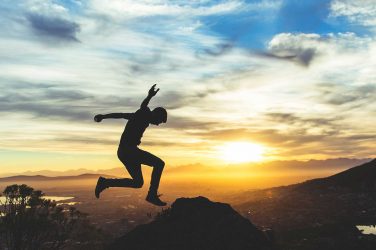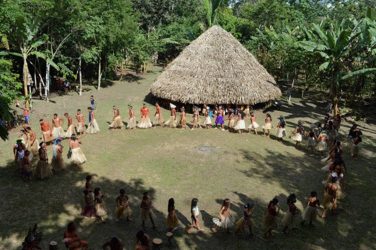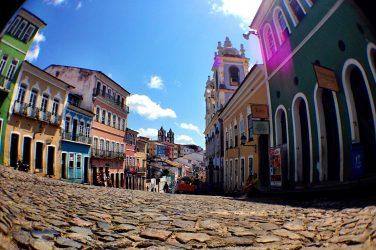 The Mamirauá Sustainable Development Reserve is approximately 600 km off of the Amazonas state capital Manaus. There, protecting the fauna and the flora is a priority, as is the well being of riverside communities’ residents.
The Mamirauá Sustainable Development Reserve is approximately 600 km off of the Amazonas state capital Manaus. There, protecting the fauna and the flora is a priority, as is the well being of riverside communities’ residents.
To work towards achieving that balance, the Uakari Lodge was created to welcome tourists and grew into an alternative income source against predatory fishing.
The floating lodge lies in the waters of the Solimões River. It offers 10 rooms in five bungalows, with a combined capacity for 24 guests. The lodge’s name is a tribute to the bald-headed uakari monkey, the object of study of biologist José Marcio Ayres, who first arrived in the area in the 1980s.
Upon witnessing the severe devastation of the animal’s original habitat, he had the idea to create a natural reserve.

More than 30 years on, tourists staying at the Uakari Lodge can contemplate not only that particular species, but animals including the black squirrel monkey, the sloth, the howler monkey, the pirarucu (Arapaima gigas) and other species endemic to the Amazon.
As of the reserve’s creation in the 1990s, pirarucu fishing was one of the primary activities of local residents, and the fish was threatened with extinction.
“So a search began for an alternative means of subsistence for the locals, and tourism is one of them,” explains the lodge’s operations manager Luciana Cobra.
She explains that the place and its activities work with the community tourism system, whereby the gains are split with the people.
The income from guests, for instance, is allocated to projects such as the “building of community centers, plumbing systems, cleaning equipment purchases etc.,” Cobra explains. As of the latest census from 2011, she says, the reserve had a population of almost 11,000.
The lodge sees about 800 tourists per year. Approximately 70% of them come from the United States, Canada, Britain and Germany. According to the manager, the activity tourists enjoy the most is the canoe ride.
“When the tide’s full, the tours are taken in paddled canoes. Each canoe carries two people, plus the guide. You get to see the animals and the wildlife, and it’s very contemplative and quiet. It’s the ride visitors enjoy the most,” she says.
Another tourist pleaser is the visit to communities. “People who come here usually want to see the nature and the local culture. They like it a lot,” Cobra asserts, adding that many of the lodge’s staff are from the native communities.
The activities available vary depending on the time of year. From December to March it’s rainy season. In April, the forest gets completely flooded and activities involve canoes and boats. The flood peaks in June and July.
Dry season lasts from August through November. During this time, people can take hikes, and there’s the most fish and birds to watch. High season at the lodge lasts from June to September – when school is out in the northern hemisphere, which is where most of the visitors come from.
With that many foreign tourists, the lodge has a few projects to teach the personnel English. The last one, in 2014 and 2015, through a crowdfunding effort, an English teacher spent a year living in the reserve and teaching a group of eight people.
As a result, tourists can rely on the work of bilingual naturalist guides. They are also college educated, mostly in fields, such as Biology, Social Studies and Tourism. Local guides are also available, and they help the visitors spot the animals hiding in the forest.
The facilities at Uakari are also sustainable. The lodge is 100% solar-powered and the sewage gets treated so the water is returned to the river in conformity with the purity standards required to prevent contamination.
So much care with nature and the population have earned Uakari some good accolades. Last year, the lodge won the Sustainability prize from the Brazilian Tour Operators Association (Braztoa) and second place in the Poverty Reduction category of the World Responsible Tourism Awards from World Travel Market, one of the leading global tourism industry events.
Contact information:
Uakari Lodge
Website: uakarilodge.com.br/
Phone: +55 97 3343-4160/+55 97 3343-9750
Email: ecoturismo@mamiraua.org.br
Directions: To reach Uakari Lodge, take a flight from Manaus to the city of Tefé. From there, a team of lodge staff will take you the rest of the way in a speedboat. Manaus-Tefé flights are available daily from Azul Linhas Aéreas and last approximately 1h20
ANBA








